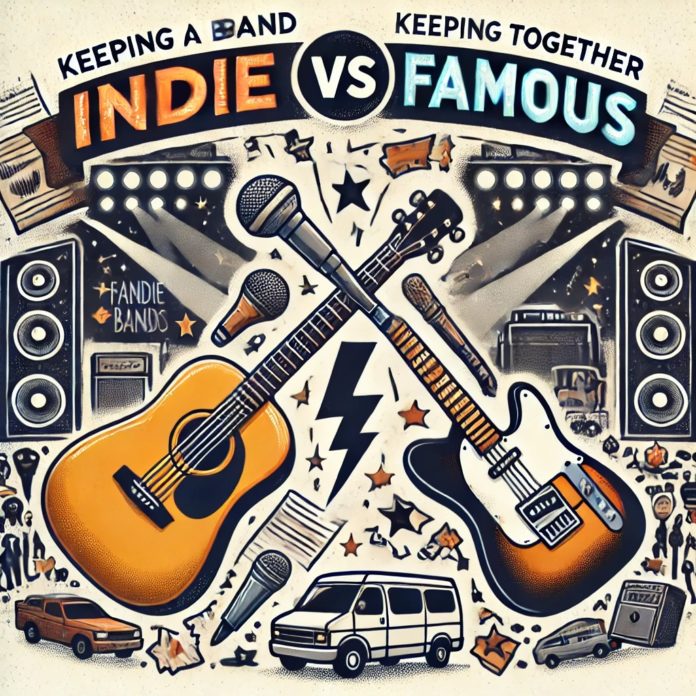If you’ve ever tried to keep a band together, you know it’s no small feat. Being in a band is like having a second family—sometimes even closer. You’ve got to balance creative differences, financial struggles, and life changes, all while trying to make music that resonates. And let’s be honest—whether you’re an indie band grinding it out in local clubs or a famous group headlining arenas, keeping the magic alive is HARD!
Think about it. Bands like Oasis, The Police, and The Beatles were global superstars, yet their interpersonal tensions were legendary. Fame doesn’t smooth out the edges. In fact, it can make those edges razor-sharp. But even on the indie level, where you’re often doing everything yourself—booking shows, managing social media, designing merch—those stresses can pile up fast. And without a massive paycheck to soften the blow (even if you split all the royalties four ways like U2 does), it’s easy to understand why bands fall apart.
When you’re an indie band, there’s no tour bus, no fancy hotels, no personal assistants. You’re likely driving from city to city in an old van that constantly threatens to break down. The gigs? They can be hit or miss. One night you’re playing to a packed house where everyone’s dancing, and the next you’re at a bar with five people, including the bartender. It’s emotionally exhausting. But it’s also thrilling—those small victories are what keep you going.
But keeping everyone motivated is tough. Band members have bills to pay, jobs to juggle, and sometimes families to take care of. And the financial strain? It’s real. Indie bands often reinvest whatever small amount they make back into the band—on gas, gear, recording time. Over time, that grind can take its toll.
So many band have talked openly about the challenges of staying together while being an indie band. Balancing their personal lives with the rigors of touring, recording, and staying creatively fresh isn’t easy. Even with a strong fanbase and critical acclaim, they’ve had to work hard to make sure they don’t burn out. That’s one of the big reasons why The Rolling Stones have stayed together for so long – they’ve taken long breaks between their albums and shorten their tours each time.
You’d think that when a band hits the big time, everything would get easier, right? Wrong! The stakes just get higher, and the cracks in the foundation get harder to ignore. Success brings money, yes, but also ego clashes, media pressure, and often, different visions for the future.
Look at The Beatles. At the height of their fame, they were unstoppable musically—but their relationships were deteriorating behind the scenes. Creative tensions and personal differences eventually led to their breakup, even though they were selling millions of albums.
Then there’s Oasis. The Gallagher brothers were constantly at each other’s throats, and while that sibling rivalry made for some incredible music, it ultimately tore the band apart. When you’re famous, the public’s eye can make those personal conflicts feel even more intense.
Fleetwood Mac is the perfect example of a band that has gone through it all—lineup changes, infighting, and personal dramas. Despite this, they’ve managed to reunite and keep performing, but not without plenty of bumps along the way. The tension within the band during the recording of Rumours is legendary, with members breaking up, but still managing to channel that pain into one of the best-selling albums of all time.
So why do it? Why fight to keep a band together? Because there’s nothing like it. When it works, there’s a special kind of magic that happens when a group of people comes together to create music. Those moments on stage where everything clicks, when the crowd is with you and the music is flowing—that’s what makes it all worth it.
And that’s true whether you’re indie or famous.







